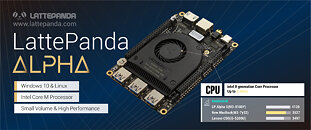- Joined
- Oct 9, 2007
- Messages
- 47,857 (7.38/day)
- Location
- Dublin, Ireland
| System Name | RBMK-1000 |
|---|---|
| Processor | AMD Ryzen 7 5700G |
| Motherboard | Gigabyte B550 AORUS Elite V2 |
| Cooling | DeepCool Gammax L240 V2 |
| Memory | 2x 16GB DDR4-3200 |
| Video Card(s) | Galax RTX 4070 Ti EX |
| Storage | Samsung 990 1TB |
| Display(s) | BenQ 1440p 60 Hz 27-inch |
| Case | Corsair Carbide 100R |
| Audio Device(s) | ASUS SupremeFX S1220A |
| Power Supply | Cooler Master MWE Gold 650W |
| Mouse | ASUS ROG Strix Impact |
| Keyboard | Gamdias Hermes E2 |
| Software | Windows 11 Pro |
The LattePanda Alpha, based on Intel Core m3-8100Y, is a Dual-Core 1.10 GHz CPU that bursts up to 3.40 GHz. Integrated Intel UHD Graphics 615 into the processor, the LattePanda Alpha delivers enhanced media conversion, fast frame rates, and 4K Ultra HD (UHD) video. All of this computing power dissipates only 8 W power, which is the perfect choice for users who need a small, portable, and light SBC for their powerful DIY handheld. And, given its incredibly small size, the LattePanda Alpha can be easily hidden, functioning as the secretly powerful brains behind users coolest project.

Key Features
DIY handheld is a cute little device. Make your own DIY handheld with LattePanda Alpha and it is so cool to carry its powerful functionality around in such a small package.
For more information about LattePanda, please visit this page.
View at TechPowerUp Main Site

Key Features
- Intel Core M3-8100Y, Dual-Core, 1.10-3.40 GHz
- Intel UHD Graphics 615
- 8 GB Memory
- Dual-Band 2.4 GHz/5 GHz Wi-Fi & Bluetooth 4.2 & Gigabit Ethernet
- USB 3.0 x3, USB Type-C x1
- 2x M.2 PCIe (Support B&M Key and A&E Key)
- Support Windows 10 & & Linux OS
- Integrated Arduino Coprocessor ATMEL 32U4
- Powered by PD adapter / 12 V DC / 7.4 V battery
DIY handheld is a cute little device. Make your own DIY handheld with LattePanda Alpha and it is so cool to carry its powerful functionality around in such a small package.
For more information about LattePanda, please visit this page.
View at TechPowerUp Main Site





 .
.
